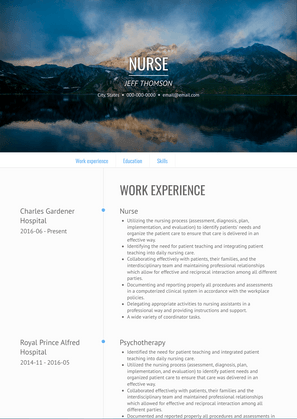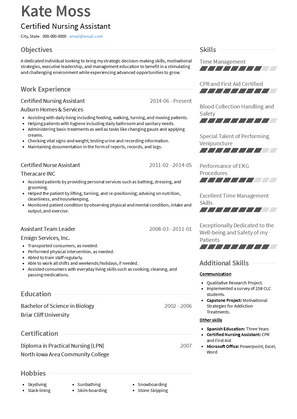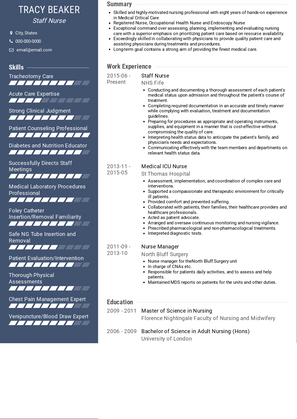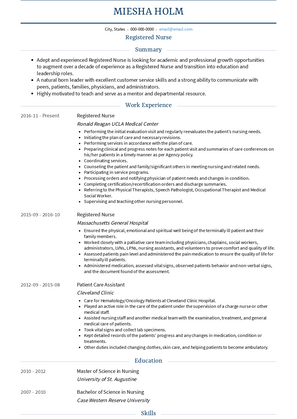CNA No Experience Resume Examples [+4 Samples]
Discover our complete guide and selection of CNA resume examples with no experience to use to create your own resume with our easy-to-use resume builder.




Note: Leverage AI to level-up your resume - Try our AI Resume Builder
The vital work carried out every day by medical professionals has been spotlighted during the Covid-19 pandemic – we’ve all seen first-hand how important healthcare workers really are. Certified nursing assistants, or CNAs, are no exception. They work in a variety of settings to provide basic support to patients from all walks of life, improving their quality of life and supporting the doctors and nurses who deliver more advanced forms of care.
Even better, the job outlook for CNAs remains bright despite the state of the economy. The number of nursing assistant and orderly roles in the US is expected to grow by 8% over the coming decade, according to the US Bureau of Labor Statistics. Training and finding work as a CNA is a great way to build a stable career in a well-regarded field.
As a result, however, competition for CNA roles can be intense – particularly for those who have no experience in the field. That’s why we’ve put together this guide to building a competitive CNA resume, even without any relevant work experience behind you. Read on for advice and examples that will help you build your first resume!
What is a CNA?
A certified nursing assistant, or CNA, provides crucial support to the healthcare system. CNAs provide direct, hands-on care to patients, often attending to their basic day-to-day needs. They can be employed in a wide range of settings, including:
- Hospitals
- Residential care facilities
- Nursing homes
- Private homes
The work carried out by CNAs may seem rudimentary, but it plays a vital role in the process of delivering care. From day to day, CNAs work to assist patients with the activities of daily living – that includes eating, toileting, moving, bathing, and grooming. That work could involve tasks ranging from taking trips to the grocery store to lifting patients into beds and wheelchairs as needed.
CNAs also need to be able to take vital signs, maintain awareness of any changes in patients’ health, and communicate on a regular basis with other members of a patient’s care team. They need to be responsible for maintaining a sanitary and safe living environment for patients, including cleaning any spills and changing soiled sheets. And most significantly, they typically provide companionship and comfort to patients – many of whom have been left lonely by the extent of the care they require.
In order to work as a CNA, you will need a high school diploma, and you will need to complete a certification in accordance with your state’s requirements before you can work. You may also need to be licensed, though licensing requirements vary between states. You should also keep in mind that working as a CNA is a physically demanding job involving a great deal of heavy lifting – the role will require you to achieve a certain standard of physical fitness.
Later in your career, you may wish to specialize by taking additional certifications. If you want to progress to become a licensed practical nurse, or LPN, you will need to complete a one- to two-year training program to earn the right license. You could also train as a RN, though this will require you to earn a two-year associate’s degree.
How to Write a CNA Resume
If you want to find work as a CNA without any prior experience, your resume needs to tell hiring managers two important things. The first is that you have the right qualifications, and thus can legally work as a CNA. The second is that you have all the skills you need – whether hard or soft – to succeed as a nursing assistant.
As a newly-trained CNA, you may not have much direct work experience. That won’t prevent you from finding work! Employers will be less concerned about your past experience than your education and training, so you should make sure your resume prioritizes the qualifications you worked so hard to earn.
However, depending on your circumstances, you may have built some relevant experience through volunteering or hobbies. If you have ever volunteered in an environment focused on providing care, for example, that could be a useful string to your bow. Any experience along those lines can and should feature on your resume.
In general, a CNA resume written by a candidate with no prior work experience should contain the following:
- A summary
- Your education
- Your skills, including any certifications or licenses you have
- Any experience you have
The Best Format for a CNA Resume
Finding the right format for your resume is all about deciding what you want hiring managers to pay attention to. When you choose your professionally-designed CNA resume template from our selection, think carefully about what the job description is asking for from candidates. Because jobs in this field require a combination of qualifications, skills, and experience, you may not need a resume format that pulls focus to any particular element.
On the other hand, if you don’t have any prior experience, you should consider prioritizing your education and training on your resume. Look for a template that will let you showcase the greatest strengths you have to offer. Later in your career, when you have direct work experience behind you, you can consider switching to a format that balances all the elements of your resume more equally.
You should also remember that many hiring managers sort through resumes using an applicant tracking system, or ATS. This can be frustrating for applicants, as it means their resumes are never actually seen by a real person – if your resume doesn’t get past the ATS software, which filters resumes based on keywords drawn from the job description, your application will usually be removed from consideration.
Thankfully, all of VisualCV’s resume templates are built to get around ATS software. Our layouts won’t confuse the software, which will maximize your chances of making it through to the next stage of consideration. That means you can focus on building the strongest possible resume, without worrying about software requirements!
3 CNA Resume Examples
Your resume should usually begin with a summary – a short, concise explanation of your best qualities. The summary should always reflect the requirements of the job description, which means you’ll need to tailor it to the role you want every time you apply. This is the first thing a recruiter will see on your resume, so it’s important to get it right!
If you don’t have much experience, your summary should focus on your education and training. Once you’ve worked in a relevant job, you will be able to focus any subsequent summaries on your past experience and workplace achievements. 3 summary examples:
- Newly qualified Certified Nursing Assistant, licensed in the state of California. Extensive volunteer experience in residential care settings. Looking for the first step in my nursing career!
- CNA licensed in the state of Texas, with past work experience in medical administration. Proven ability to thrive under pressure, with great communication skills.
- CNA with three years of unpaid home care experience. Able to lift 150 pounds. Compassionate and dedicated to providing the highest standards of care.
How Not to Write a CNA Resume Summary
Don’t write a wordy, overly-personal summary that could fit into your cover letter instead. Your cover letter should tell the story of why you want the job, but your resume summary needs to be shorter and more to the point. It should be a brief appraisal of why you fit the job description and what you can bring to the table.
In fact, some recruiters don’t believe that a resume summary is necessary. If you’re finding it too difficult to get the format right, don’t worry – you can always choose to leave it out. Don’t Do This:
- I have spent three years caring for my elderly mother in my home, and have discovered a passion for delivering home-based patient care as a result. This drove me to pursue my certification and license to become a CNA. I am now looking for my first role in this field.
Do You Need a Resume Objective?
When applying for non-entry level positions, you won’t normally need a resume objective. But if you have never worked in a particular field before, or if you don’t have much experience, you should consider including an objective alongside your resume summary.
Confused about the difference between the two? Remember, a summary is just a short description of what makes you suitable for the job you’re applying for. Your objective, meanwhile, is a one-sentence statement about your career goals – for example, the type of job you want to do. CNA Resume Objective Example:
- Licensed CNA in the state of New York, seeking to apply my training in a new career.
How to Describe Your Experience on Your CNA Resume
It’s easy to be intimidated by the Experience section on your resume when you don’t have much to fill it out! But even if you really don’t have anything that could fit the bill, don’t panic. You can leave out the Experience section entirely, and make sure that your education, skills and qualifications are listed comprehensively instead.
If you have volunteer experience, on the other hand, you can and should include that here.
Describe Your Experience Effectively
Whatever the experience you’re writing about, make sure you describe it in a way that reflects the work you put into earning it. Don’t just list your regular tasks! Write about what you accomplished while carrying them out.
Recruiters want to see hard facts about your performance, even when you were just a volunteer. You need to show what you did to make your work stand out – that way, recruiters are more likely to believe that you can do it again in a new role. CNA Resume Experience Example: Volunteer Care Assistant, Green Cove Residential Home | 2017-2019
- Assisted home staff in providing enrichment activities for residents; led in delivering an art class which achieved record attendance rates
- Cleaned and maintained common areas, ensuring a comfortable and sanitary environment for residents
- Built strong and lasting relationships with residents, improving their quality of life and enriching their relationship to their care teams overall
How Not to Describe Your Experience
You should never just list the tasks you performed without adding any further information. Based on your job title, hiring managers will be able to surmise what you did as part of a previous role! You have to prove to them that you were able to get good results when you did it. Don’t Do This: Volunteer Care Assistant, Green Cove Residential Home | 2017-2019
- Led enrichment activities
- Cleaned common areas
- Talked to residents
How to List Skills on Your CNA Resume
It can be tricky to figure out which skills to list on your resume. The job description can be a useful guide, but it may not include every skill you’ll be expected to have – there are some skills that recruiters will expect you to have as a matter of course.
For general information about skills on your resume, check out our resume skills guide here!
Top CNA Resume Skills in Demand
| Hard Skills for CNAs | Soft Skills for CNAs |
|---|---|
| First aid | Communication |
| CPR | Empathy |
| Patient safety | Organization |
| Wound care | Time management |
| Recording information | leadership |
| Heavy lifting | Attention to detail |
| Cooking | Motivation |
| Cleaning | Active Listening |
Professional Certifications for CNAs
Having a certification on your resume shows hiring managers that you can take the initiative to give your career a boost. It also acts as proof of your skills and abilities. Remember, when trying to find work in the medical field, you need to give hiring managers confidence that you can perform all the necessary tasks that will help your patients – a certification can help you to make that point.
As a CNA, you will need to be certified as a matter of course. But if you want to aim for more specialized positions with higher salaries in future, here are some extra certifications that could help bolster your prospects!
CNA II and CNA III
Once you’ve earned your initial CNA certification, you may be able to pursue additional training. Each level of CNA training comes with a slight pay bump, which could set you up for success right away! However, you’ll need to check whether your state offers these programs, as availability can be variable.
Patient Care Technician
If you’re currently employed as a CNA, you may have the opportunity to participate in the patient care technician program, organized by the American Phlebotomy Association. You could learn how to perform phlebotomy on patients and take EKG readings, alongside your existing skills.
Medication Aide Certification (MACE)
Taking the MACE can train you to give medications to patients – a skill not all CNAs have. This certification will make you much more employable! You may even be able to take it in coordination with your workplace, if you’re already employed as a CNA.
The Most Important Soft Skills for Your CNA Resume
Soft skills will help you complete your day-to-day tasks as a CNA. But more importantly, they will show a hiring manager that you can do the work that will be asked of you if you get the job. For applicants without prior work experience, soft skills are a great way to shore up your resume.
Here are some of the most important soft skills to include on your CNA resume!
Communication
Working as a CNA will require you to communicate clearly with your patients about their needs – but also with the other members of their care team. If you can make yourself understood, even in stressful situations, you will have a real advantage in your role.
Empathy
Many of the patients you will work with as a CNA will be scared, lonely and frustrated. You may be one of their most frequent points of contact – which means you will need to be able to provide comfort and compassion to them, regardless of the circumstances. If you’re capable of that, you could really thrive as a CNA.
Organization
Your tasks as a CNA will vary from day to day, according to your patient’s needs. If you can keep on top of changing circumstances without compromising the quality of your work, hiring managers will be much more likely to take your application seriously.
What should I include in my objective statement on a CNA resume with no experience?
Your objective statement should highlight your CNA certification, passion for patient care, and eagerness to support healthcare teams. For example: "Certified Nursing Assistant with a strong foundation in patient care and hands-on training through clinical practice. Eager to apply my compassionate nature, communication skills, and dedication to improving patient well-being at [Healthcare Facility Name]."
How can I highlight relevant skills on a CNA resume if I have no experience?
If you have no experience, focus on the skills you’ve developed through your certification program, clinical training, and any volunteer work. Highlight your knowledge of basic nursing skills, understanding of patient care procedures, and familiarity with medical equipment. Emphasize your strong communication skills, empathy, and ability to follow instructions and work as part of a healthcare team.
Should I include volunteer work on my CNA resume?
Yes, including volunteer work is valuable, especially if it involved working in a healthcare setting, assisting with patient care, or supporting medical staff. Volunteer experiences that demonstrate your ability to interact with patients, assist with daily living activities, or provide comfort and support can strengthen your resume and show your commitment to the healthcare field.
How can I demonstrate my understanding of patient care on my resume?
To demonstrate your understanding, include details about your CNA certification and any hands-on clinical training you’ve received. Highlight your familiarity with basic patient care tasks, such as bathing, feeding, and mobility assistance. Mention any experience you have with vital sign monitoring, infection control, and patient safety procedures, even if it was part of your training program.
What should I include in the education section of my CNA resume?
Include your CNA certification and any related coursework or training programs. If you’ve completed a high school diploma or equivalent, be sure to include that as well. Mention any specialized training you’ve received in areas such as CPR, First Aid, or infection control, and include details about your clinical practice or externships that provided you with hands-on experience.
Can I include non-medical work experience on my CNA resume?
Yes, non-medical work experience can be valuable, especially if it demonstrates skills such as customer service, organization, or teamwork. For example, roles in hospitality, retail, or any position that required you to interact with people, manage tasks, or work in a fast-paced environment can provide relevant experience for a CNA position.
How do I format a CNA resume with no experience?
Use a clean and professional format with sections for your objective, skills, education, and experience. Start with a strong objective statement that outlines your enthusiasm for the role. Then, list your relevant skills and any experience, including volunteer work, internships, or training programs, that demonstrate your ability to handle the responsibilities of a CNA. Highlight any certifications or training that support your qualifications.
How important is a cover letter when applying for a CNA position with no experience?
A cover letter is very important as it allows you to explain your passion for healthcare and why you’re a great fit for the job, even with no direct experience. Use the cover letter to highlight your CNA certification, any relevant training or coursework, and your enthusiasm for providing compassionate patient care. Tailoring your cover letter to the specific healthcare facility and its patient population can help make a strong impression.
How can I make my CNA resume stand out with no experience?
To make your resume stand out, focus on your CNA certification, hands-on training, and any relevant experience you’ve gained through volunteering or clinical practice. Highlight your understanding of patient care procedures, your ability to assist with daily living activities, and your commitment to ensuring patient comfort and safety. Tailoring your resume to the specific needs of the healthcare facility and the type of care they provide can also help you differentiate yourself from other candidates.
CNA Salaries
Nursing, as a career path, has great earning potential. But as a newly-trained CNA, how much can you expect to make?
According to Indeed, CNAs can expect to make an average of $19.83 per hour. But check out how you can expect your salary to increase over time:
- 1 to 2 years: $19.23/hour
- 3 to 5 years: $20.25/hour
- 6 to 9 years: $20.76/hour
- 10 years or more: $22.88/hour
Final Thoughts
Working as a CNA is a great way to build experience in the field of nursing. You’ll learn about the patient care process from the ground up, and you’ll have opportunities to build the experience and skills that will allow you to progress in the future. Plus, you’ll be able to make a difference to your patients’ lives every day – what’s more rewarding than that?
VisualCV has you covered as you prepare to apply for your first CNA job. You can customize every aspect of your resume with a VisualCV Pro membership, which will help you to stand out from other applicants in your field. We’ll be behind you every step of the way as you forge the career of your dreams!
-
What should I include in my objective statement on a CNA resume with no experience?
-
How can I highlight relevant skills on a CNA resume if I have no experience?
-
How can I demonstrate my understanding of patient care on my resume?
-
What should I include in the education section of my CNA resume?
-
How important is a cover letter when applying for a CNA position with no experience?
Copyright ©2025 Workstory Inc.
